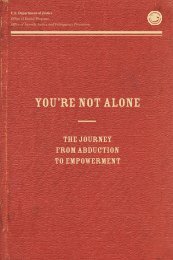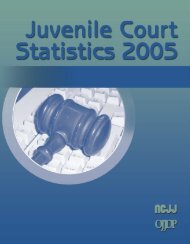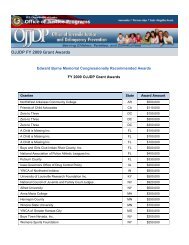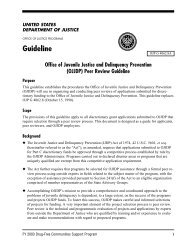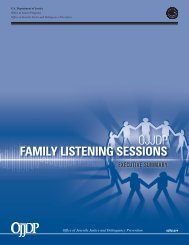OJJDP National Conference Program - Office of Juvenile Justice ...
OJJDP National Conference Program - Office of Juvenile Justice ...
OJJDP National Conference Program - Office of Juvenile Justice ...
Create successful ePaper yourself
Turn your PDF publications into a flip-book with our unique Google optimized e-Paper software.
Thursday, October 13, 10:15 a.m. – 11:45 a.m.(continued)improve the status <strong>of</strong> youth prosecuted in adult court, focusingon Connecticut and Virginia.AGENDA: THURSDAY, OCTOBER 13Moderator: Linda Rosen, <strong>OJJDP</strong>This presentation focuses on both the strengths andweaknesses in current juvenile justice applications <strong>of</strong> restorativejustice and considers changes that could makethe restorative model useful for a wide range <strong>of</strong> crime andharm, especially violent crimes.What Is DMC and How Does It Affect My Work?(Track: Disproportionate Minority Contact)<strong>National</strong> Harbor 11Brad Richardson, DMC Coordinator, IowaJudge Patricia Martin, Circuit Court <strong>of</strong> the Cook County (Illinois)Child Protection DivisionModerator: Carmen Santiago-Roberts, <strong>OJJDP</strong>This workshop will provide a brief history and overview <strong>of</strong>Section 223(a)(22) <strong>of</strong> the <strong>Juvenile</strong> <strong>Justice</strong> and DelinquencyPrevention Act <strong>of</strong> 1974, as amended, <strong>of</strong>ten referred to asthe Disproportionate Minority Contact (DMC) core requirement.The session will also provide information on how DMCaffects “crossover” youth in the juvenile justice and childwelfare systems, the lack <strong>of</strong> opportunities for prevention andtreatment, and adverse results <strong>of</strong> DMC on communities.Words That Work: Communicating onYouth <strong>Justice</strong> Reform<strong>National</strong> Harbor 12–13Michael Bocian, GBA StrategiesMac Pritchard, Pritchard CommunicationsEric Solomon, Campaign for Youth <strong>Justice</strong>Moderator: Catherine Doyle, <strong>OJJDP</strong>The panel will discuss key strategies for communicatingabout youth justice issues. Topics examined will includeknowing your audiences, developing a coherent frameworkfor your message, and choosing your words carefully. Thiswill be an interactive session in which participants may askquestions and practice their communication skills.Youth in the Adult Criminal <strong>Justice</strong> SystemPotomac 1–3Howard N. Snyder, Bureau <strong>of</strong> <strong>Justice</strong> StatisticsSheriff Gabriel Morgan, Newport News, VirginiaToni Walker, State Representative, ConnecticutModerator: Morris Thigpen, <strong>National</strong> Institute <strong>of</strong> CorrectionsThis workshop will begin with an update on the latest federalefforts to address the issues facing youth in the adult criminaljustice system. Presenters will discuss new national datacollection efforts to document the status <strong>of</strong> youth in adultcriminal courts. State experts will discuss the latest trends to<strong>OJJDP</strong>’s <strong>National</strong> Mentoring <strong>Program</strong>s—ServingAmerica’s YouthPotomac 4–6Karen Mathias, Big Brothers Big Sisters <strong>of</strong> AmericaRick Goings, Boys & Girls Clubs <strong>of</strong> AmericaJennifer Sirangelo, <strong>National</strong> 4–H CouncilModerator: Kellie Dressler, <strong>OJJDP</strong>This session will highlight mentoring programs from threenational organizations that <strong>OJJDP</strong> supports: Boys & GirlsClubs <strong>of</strong> America, Big Brothers Big Sisters <strong>of</strong> America, andthe <strong>National</strong> 4–H Council. These organizations provide a variety<strong>of</strong> mentoring programs targeted for at-risk youth acrossthe nation. Each presenter will share information about theirorganization’s mentoring programs, how the programs areimplemented across the nation, and outcomes for youththat their programs serve. The presenters will discuss directone-on-one mentoring, group mentoring, or peer-mentoringservices that they provide to underserved youth populationsand to youth with a parent in the military, including adeployed parent.Using Volunteer Standards To Assure <strong>Program</strong> Quality inYouth-Serving <strong>Program</strong>sChesapeake 1–3Megan Robinson, Communities in SchoolsWaleed Hypolite, United Way <strong>of</strong> the <strong>National</strong> Capital AreaPaulina Migalska, United Way <strong>of</strong> AmericaModerator/Presenter: Sally Erny, <strong>National</strong> CASAThis workshop will examine how youth-serving organizationsdeveloped standards for volunteer training and supervisionand a mechanism for measuring compliance with thesestandards. The workshop will focus on the importance <strong>of</strong> establishingvolunteer management standards and will providepractical guidance for other organizations that are developingand implementing standards <strong>of</strong> their own.Law Enforcement and Youth Partnerships: Alternativesto Arrest (Track: Law Enforcement Partnerships)Chesapeake 4–6Morris Copeland, Miami-Dade (Florida) Police DepartmentInspector Bryan Schafer, Minneapolis (Minnesota) PoliceDepartmentModerator: IACP representativeThis session will examine strategies that two police departmentshave adopted to keep youth out <strong>of</strong> the formal justicesystem but still hold them accountable. These programs alsoprovide opportunities for law enforcement to work with youthin positive ways and to partner with local nonpr<strong>of</strong>it organizationsto ensure that troubled youth receive needed services.18


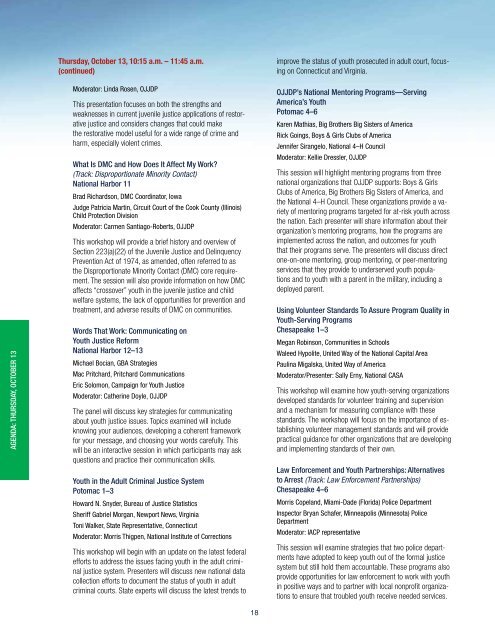
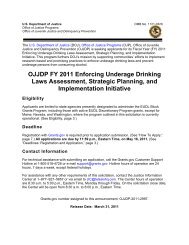

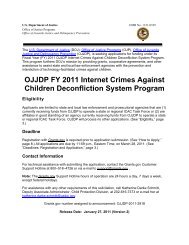
![Chapter 5 [PDF] - Office of Juvenile Justice and Delinquency ...](https://img.yumpu.com/46584340/1/190x245/chapter-5-pdf-office-of-juvenile-justice-and-delinquency-.jpg?quality=85)

